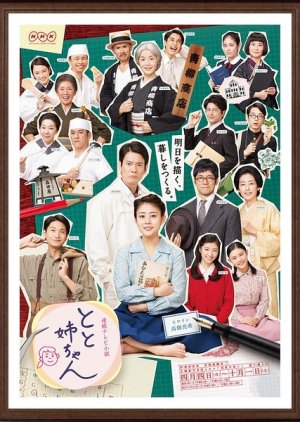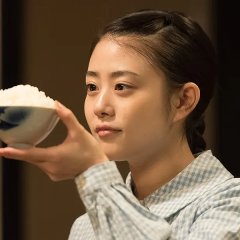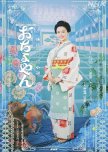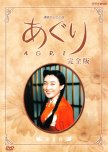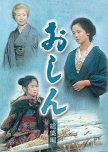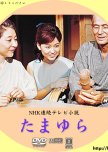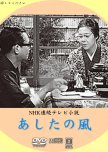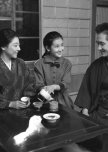 The Big 10 Japanese Dramas on MDL
The Big 10 Japanese Dramas on MDL The eldest daughter of the Kohashis, Tsuneko, was 11 years old when her father Takezo died of tuberculosis. Taking her father’s teachings about the importance of ordinary life to heart, she became ‘Toto One-chan’, a paternal figure to her mother Kimiko and two younger sisters Mariko and Yoshiko. She struggles to sustain the family as the head of the household. Right after the war, she launches a lifestyle magazine created for the sake of females together with Mariko and Yoshiko in a devastated Tokyo. It is called ‘Your Life’ and was full of practical articles for readers. With the help of the genius editor Hanayama Isaji, the magazine grew to become essential to females living in the period of high economic growth. Edit Translation
- English
- magyar / magyar nyelv
- dansk
- Norsk
- Native Title: とと姉ちゃん
- Also Known As: Totone-chan , Totonee-chan
- Director: Ohara Taku, Fujinami Hideki
- Screenwriter: Nishida Masafumi
- Genres: Historical, Business, Life, Drama
Cast & Credits
- Takahata Mitsuki Main Role
- Nishijima HidetoshiKobashi Takezo [Father]Support Role
- Kimura TaeKobashi Kimiko [Mother]Support Role
- Sagara ItsukiKobashi Mariko [Second daughter]Support Role
- Sugisaki HanaKobashi Yoshiko [Third daughter]Support Role
- Mukai OsamuKobashi Tetsuro [Uncle]Support Role
Reviews

"In the beginning, women were the sun..."
"Toto Nee-chan" is my 18th asadora and it quickly became one of my favorites that I've watched thus far. Takahata Mitsuki truly left a deep impression on me with her role as the heroine, Tsuneko. I really liked her in "Gochisosan" before but she really knocks it out of the park with this one. Her smile lights up the room and her subtle line deliveries tell you exactly how Tsuneko is feeling. I was impressed with Mitsuki's acting and how well the writer understood the character that they were writing.Nishijima Hidetoshi plays Tsuneko's father and, despite only appearing in about six episodes, makes yet another unforgettable impression. Before dying of tuberculosis, he asks Tsuneko to take his place in the family. She agrees and thus becomes "Toto Nee-chan." I appreciate that the finale, in which he appears via a dream, addresses what a heavy burden this is. However, I also understand why he would ask this of her, considering the very patriarchal society at the time. Thankfully, the unhealthy part of only lasts until Tsuneko's younger sisters are grown up. She then realizes that the entire family can support each other while she can still be the "head of the family" technically. At the end of the day, despite being a heavy burden, I think the promise gave Tsuneko a true purpose in life.
Tsuneko's sisters are Mariko (Sagara Itsuki) and Yoshiko (Sugisaki Hana & Irei Himena). These two are given strong characterizations and feel like co-leads with Mitsuki most of the time. Their mother is played by Kimura Tae. Another strong performance. I especially liked her storyline with her estranged mother Takiko (Daichi Mao). Unfortunately, by the end of the asadora, Tsuneko's sisters and mother feel somewhat pushed by the wayside. This is understandable since their storylines were mostly finished, though just a bit disappointing.
Besides Tsuneko, I think the second most memorable character is Hanayama-san (Karasawa Toshiaki). [I first saw Karasawa in the 1988 asadora "Jun-chan no Ouenka" and his acting skill has become so good since.] Tsuneko first meets Hanayama briefly before the war. They meet again and he agrees to become the chief editor of the magazine she's starting with her sisters. Hanayama seems like one of those typical mentor characters in asadoras. However, I feel their relationship goes deeper than that. To me, Tsuneko and Hanayama are a good example of how "soulmates" don't have to be romantic partners. I also enjoyed Hanayama's uncompromising nature, which is a good foil to Tsuneko who initially wants to please everyone.
To address the elephant in the room, Tsuneko doesn't get married or have children. She does technically have a love interest, Hoshino-san (Sakaguchi Kentaro). [He was also amazing in "Okaeri Mone."] He proposes to her just before the war, but she turns him down to stay with her family. They meet again fifteen years later and seemingly have another chance. However, the timing isn't right again and Hoshino makes the best decision for his children at the time. Their romance is very pure and heartbreaking. I would have loved for their relationship to have worked out, but I find it realistic and I respect the decision to have an asadora heroine not get married for once.
I also loved the music for "Toto Nee-chan," particularly the theme song "Hanataba o Kimi ni" by Hikaru Utada. Her songs for dramas always seem to capture the essence of the series. I could listen to this song for hours and I never got tired of it.
To close out this review: I absolutely loved this asadora. The writing was superb from start to finish with an endless amount of impressive characters and moments. The writer did such a good job closing out the drama with the last few weeks. The finale was also one of the best I've seen from an asadora so far. It was infinitely satisfying and I know I'll go back to watch it again very soon. An A+ asadora that I would recommend to everyone.
My Asadora Ranking: https://kisskh.at/list/LAlqpp21

I’ve thought about what makes an asadora like Toto Nee-chan so strong compared to some others, and it’s easy to see what it is: A CLEAR ADHERENCE TO A SINGULAR STORYLINE. From its very first scene (where you see the main characters already grown and succesful as magazine publishers), the stage is set: you are going to hear a tale of a family of three sisters who strive through wars and hardships to one day become publishing giants, and the asadora never wavered. Every arc and challenge the family met became a stone in the foundation of what they would become and what their fortunes and fates would be. From Tsuneko going to school as a child, all the way to success, you follow her through every step of her life, crying and cheering along the way with her.
Usually a show’s best parts are in the first half of the drama and there is some faltering at the second half, but Toto Nee-chan kept you interested with each new development, and I remember being at week 20 and STILL feeling as excited as I was in its first few chapters! And by the time of the show’s last great arc, I couldn’t stop watching, burning through the episodes to see what happened next, I was SO INVESTED and had to force myself to slow down! SUCH a great STORY!
Watching Tsuneko grow up and rise to the challenges to create her dreams in both work and family was a joy to watch and you felt sadness with every tragedy that befell her and warmth in your heart every time she successfully completed her one of her dream goals.
In asadoras, they tended to show the heroine’s entire life, from beginning, middle, and (sometimes) all the way to the end...in that same way, I’m impressed at how well Toto Nee-chan gives you the sense of time moving. People growing up, moving away, etc....
As each arc ends and the children grow older, you really feel like you’re witnessing a whole life’s work. In the latter chapters with the sisters running the publishing house, thinking back on the early episodes where she and her sisters were still living with Grandmother Takiko in Tokyo, it seemed a million years ago, it seemed like a completely different drama! It truly gave you the feeling of history, like those were the "olden days"...
I began watching this because of my love for Mitsuki Takahata, and I’m so glad I did, this asadora has been a tour-de-force for her and has absolutely become my favorite Mitsuki Takahata role and drama! Since picking up Toto Nee-chan, I’ve put her latest show “Muchaburi” on hold so as to not distract from immersing in the asadora, but now it’s done I can finally go back and catch up. Hope it measures up, because Toto Nee-chan has become the Mitsuki Takahata drama ALL others must compare to!

